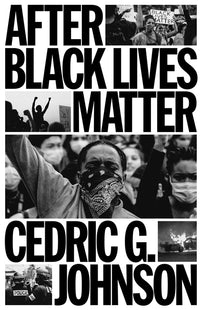After Black Lives Matter: a Letter From the Editor
"This is the most thorough exercise in historical and political thinking on the topic. The argument is simple with deep implications. Deploying accessible political theory, historical arguments and contemporary examples, After Black Lives Matter points the way toward a different kind of movement and a different sort of society." – Asher Dupuy-Spencer, editor

I first heard about the existence of Cedric’s book in a conversation with another author, Touré Reed. Touré had seen bits of the then unfinished manuscript and assured me it was going to be excellent. I immediately got in contact with Cedric in the hopes that I could convince him to bring the book to Verso. I ended up leaving the conversation pleased. Cedric had another book for me, the hard-hitting polemic The Panthers Can’t Save Us Now. As for After Black Lives Matter, I got a maybe. That was in 2019. It is 2023 and The Panthers is out in our Jacobin Series and After Black Lives Matter is already making a splash.
The massive protests that followed the murder of George Floyd were hailed as a new awakening for the left in the US. American media was certainly deeply affected. So too our language. Our institutions, however, remained stubbornly unchanged. The violence of policing and the violence of poverty persist, more or less as they did before. Now there are #BLM signs in the windows of cafes and townhouses in newly hip neighborhoods and big brands celebrate black voices. I think many people’s awareness and sentiments really were changed by the movement in 2020 but the conditions of life for the most vulnerable and precarious in our society remain painfully low. For Cedric G. Johnson, the problem of why Black Lives Matter achieved so little despite being so emotionally evocative and politically contagious requires answering.
This book makes a necessary and uncompromising intervention into the debates around race, policing, and inequality in the US. It takes aim at the assumptions and strategies associated with the main line of Black Lives Matter. And, for that matter, bon-pensant liberal thinking in general. It should go without saying that this book will court its fair share of controversy. If you want to make the liberal gentrifier clutch their pearls have them read this excerpt from the final chapter:
If there is an anti-capitalist or even downwardly redistributivist politics expressed by different Black Lives Matter elements, it has been drowned out in the flood of black wealth creation, fetishism and nostalgia of Jim Crow black entrepreneurship, corporate diversity initiatives, disparities discourse and a reparations demand, which has served more as Potemkin housing for postsegregation, neoliberal black politics than a viable political demand with popular traction. None of these political tendencies addresses the fundamental problem underlying mass incarceration, that is the turn from welfare to warfare as the means of regulating relative surplus population. Instead, the singular focus on and imprecision of institutional racism as the framing favored by Black Lives Matter protestors deprioritizes and obscures the predicament of the most submerged and dispossessed elements of the black population. Moreover, the black exceptionalist view of policing and prisons has isolated the predicament of the criminalized black poor from millions of other Americans who face routine surveillance, arrests and carceral regulation. A dogged focus on anti-black racism cannot explain the problem before us and is counterproductive to building the kind of broad popular coalitions capable of reversing the carceral expansion, coalitions that have yet to materialize beyond the most liberal reaches of the country.
But this book is not about click-bait or shock. This is the most thorough exercise in historical and political thinking on the topic. The argument is simple with deep implications. Deploying accessible political theory, historical arguments and contemporary examples, After Black Lives Matter points the way toward a different kind of movement and a different sort of society. Inequality and poverty are the causes of not only crime and violent policing but also the emergence of our horrific carceral system and the durability racial inequality itself.
The redistributive logic of Cedric’s book should be interpreted not simply as a critique of race essentialism. More importantly, it is the crystallization of an optimistic materialist logic: there are institutional and material solutions to our social problems. Racial inequality and racism are not transhistorical properties of our existence. Rather, they are the result of political and economic arrangements.
It will take a broad and militant coalition to change those conditions and that coalition must be built around shared interests and common dreams. Certainly, a broad coalition will have its internal conflicts. But, as Cedric puts it, “it is only through confronting those contradictions head on that we might even begin to hope to transform these injustices and produce a society where racism has lost its power, poverty is unthinkable and police killings are the subject of museum exhibits.”
I am immensely proud to publish this book and I look forward to the productive and comradely debate it will generate. It is my hope that this book plays some part in ushering in a more effective and transformative politics around race and inequality in the US.
Asher Dupuy-Spencer
Verso, New York City
